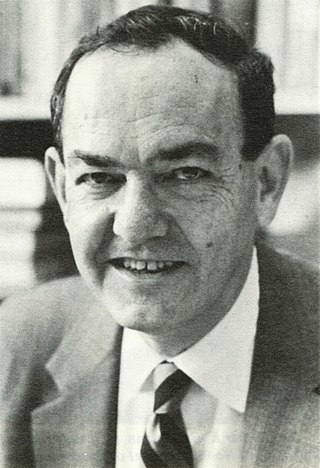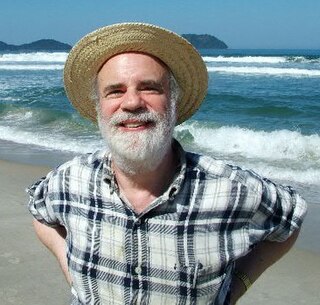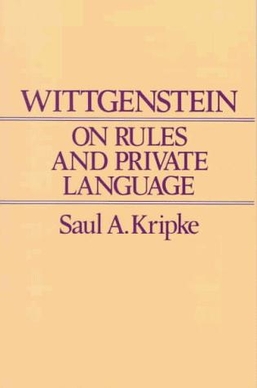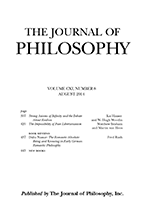Contents
| |||
|---|---|---|---|
| +... |
2001 in philosophy
| |||
|---|---|---|---|
| +... |
2001 in philosophy

Herbert Alexander Simon was an American political scientist whose work also influenced the fields of computer science, economics, and cognitive psychology. His primary research interest was decision-making within organizations and he is best known for the theories of "bounded rationality" and "satisficing". He received the Nobel Memorial Prize in Economic Sciences in 1978 and the Turing Award in computer science in 1975. His research was noted for its interdisciplinary nature, spanning the fields of cognitive science, computer science, public administration, management, and political science. He was at Carnegie Mellon University for most of his career, from 1949 to 2001, where he helped found the Carnegie Mellon School of Computer Science, one of the first such departments in the world.

Saul Aaron Kripke was an American analytic philosopher and logician. He was Distinguished Professor of Philosophy at the Graduate Center of the City University of New York and emeritus professor at Princeton University. Kripke is considered one of the most important philosophers of the latter half of the 20th century. Since the 1960s, he has been a central figure in a number of fields related to mathematical and modal logic, philosophy of language and mathematics, metaphysics, epistemology, and recursion theory.
Analytic philosophy is a broad, contemporary movement or tradition within Western philosophy and especially anglophone philosophy, focused on analysis. Analytic philosophy is characterized by a style of clarity of prose and rigor in arguments, making use of formal logic and mathematics, and, to a lesser degree, the natural sciences. It is further characterized by an interest in language and meaning known as the linguistic turn. It has developed several new branches of philosophy and logic, notably philosophy of language, philosophy of mathematics, philosophy of science, modern predicate logic and mathematical logic.

David John Chalmers is an Australian philosopher and cognitive scientist specializing in the areas of the philosophy of mind, and the philosophy of language. He is a professor of philosophy and neural science at New York University, as well as co-director of NYU's Center for Mind, Brain and Consciousness. In 2006, he was elected a Fellow of the Australian Academy of the Humanities. In 2013, he was elected a Fellow of the American Academy of Arts & Sciences.
A semantic theory of truth is a theory of truth in the philosophy of language which holds that truth is a property of sentences.

Wittgenstein on Rules and Private Language is a 1982 book by philosopher of language Saul Kripke in which he contends that the central argument of Ludwig Wittgenstein's Philosophical Investigations centers on a skeptical rule-following paradox that undermines the possibility of our ever following rules in our use of language. Kripke writes that this paradox is "the most radical and original skeptical problem that philosophy has seen to date" (p. 60). He argues that Wittgenstein does not reject the argument that leads to the rule-following paradox, but accepts it and offers a "skeptical solution" to alleviate the paradox's destructive effects.
A causal theory of reference or historical chain theory of reference is a theory of how terms acquire specific referents based on evidence. Such theories have been used to describe many referring terms, particularly logical terms, proper names, and natural kind terms. In the case of names, for example, a causal theory of reference typically involves the following claims:

Kaarlo Jaakko Juhani Hintikka was a Finnish philosopher and logician. Hintikka is regarded as the founder of formal epistemic logic and of game semantics for logic.
A mediated reference theory is any semantic theory that posits that words refer to something in the external world, but insists that there is more to the meaning of a name than simply the object to which it refers. It thus stands opposed to direct reference theory. Gottlob Frege is a well-known advocate of mediated reference theories. Similar theories were widely held in the middle of the twentieth century by philosophers such as Peter Strawson and John Searle.
A referential theory of meaning is a theory of language that claims that the meaning of a word or expression lies in what it points out in the world. Ex, The word tree may have an exterior meaning from the one always intended, that is, tree can be translated into different form of meaning .The object denoted by a word is called its referent. Criticisms of this position are often associated with Ludwig Wittgenstein.
Jonathan Lear is an American philosopher and psychoanalyst. He is the John U. Nef Distinguished Service Professor in the Committee on Social Thought at the University of Chicago and served as the Roman Family Director of the Neubauer Collegium for Culture and Society from 2014 to 2022.

Stephen Roy Albert Neale is a British philosopher and specialist in the philosophy of language who has written extensively about meaning, information, interpretation, and communication, and more generally about issues at the intersection of philosophy and linguistics. Neale is a Distinguished Professor of Philosophy and Linguistics and holder of the John H. Kornblith Family Chair in the Philosophy of Science and Values at the Graduate Center, City University of New York (CUNY).

The Journal of Philosophy is a monthly peer-reviewed academic journal on philosophy, founded in 1904 at Columbia University. Its stated purpose is "To publish philosophical articles of current interest and encourage the interchange of ideas, especially the exploration of the borderline between philosophy and other disciplines." Subscriptions and online access are managed by the Philosophy Documentation Center.
A priori and a posteriori are Latin phrases used in philosophy to distinguish types of knowledge, justification, or argument by their reliance on experience. A priori knowledge is independent from any experience. Examples include mathematics, tautologies and deduction from pure reason. A posteriori knowledge depends on empirical evidence. Examples include most fields of science and aspects of personal knowledge.

Naming and Necessity is a 1980 book with the transcript of three lectures, given by the philosopher Saul Kripke, at Princeton University in 1970, in which he dealt with the debates of proper names in the philosophy of language. The transcript was brought out originally in 1972 in Semantics of Natural Language, edited by Donald Davidson and Gilbert Harman. Among analytic philosophers, Naming and Necessity is widely considered one of the most important philosophical works of the twentieth century.
1972 in philosophy
1980 in philosophy
John Patton Burgess is an American philosopher. He is John N. Woodhull Professor of Philosophy at Princeton University where he specializes in logic and philosophy of mathematics.
2013 in philosophy